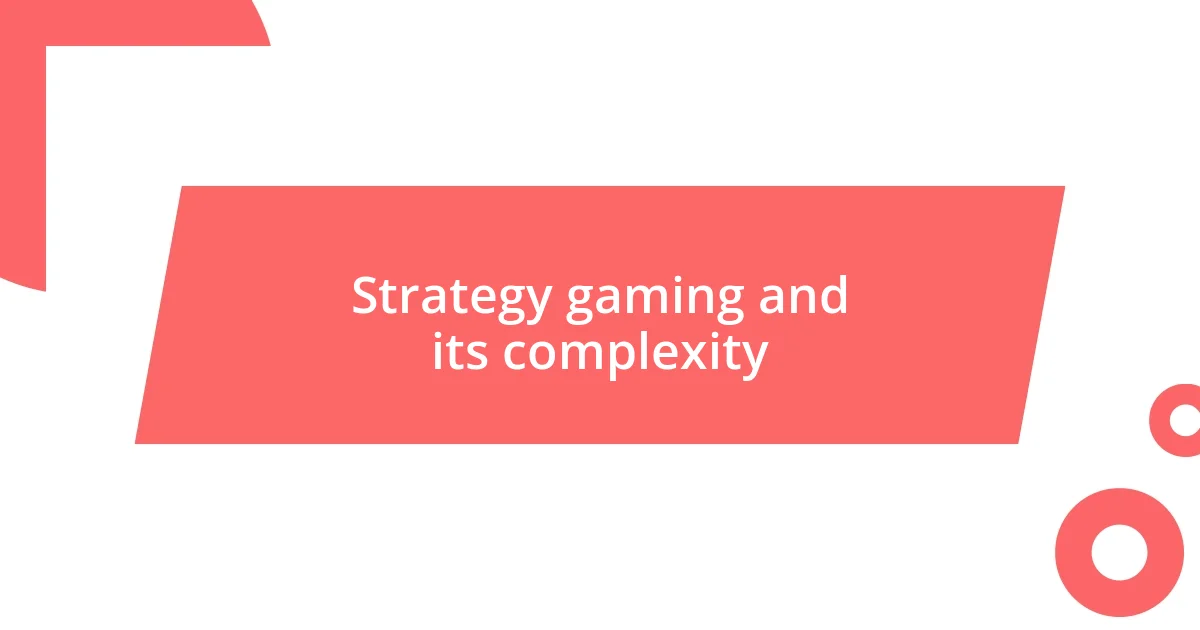Key takeaways:
- Gaming genres serve as a framework for players, allowing exploration and emotional connections, leading to unexpected favorites.
- Popular gaming genres today include Action-Adventure, RPGs, FPS, Simulation, Strategy, MOBA, and Survival Horror, each catering to different player experiences.
- The future of gaming genres is likely to see innovation through virtual reality, cross-genre games, and increased accessibility for diverse audiences.

Understanding gaming genres
Gaming genres are like flavors; they cater to different preferences and experiences. I remember when I first discovered role-playing games (RPGs) and was swept away by the immersive worlds and character development. Isn’t it fascinating how a simple choice of genre can evoke such strong emotions and create a lasting connection to the game?
Diving deeper, genres serve as a framework that helps players find their gaming passion. For example, I’ve often found myself captivated by strategy games, where every move matters, akin to a chess match on a digital board. There’s something incredibly satisfying about planning and executing a strategy, which makes me question: what is it about the challenges and victories in strategy games that brings us joy and fulfillment?
Understanding the nuances of gaming genres can also enhance our overall experience. I’ve seen how exploring different genres opens up new realms of creativity and storytelling. It’s like a treasure hunt—each genre has unique gems waiting to be discovered. How often do you find yourself pleasantly surprised by a game outside your usual preferences? This sense of exploration can lead to unexpected favorites that enrich our gaming journey.

Popular gaming genres today
Today, gaming genres are more vibrant than ever, attracting diverse players with their unique offerings. For instance, while I’ve always enjoyed action-adventure games for their adrenaline-pumping experiences, I often find solace in simulation games that allow for creativity and storytelling. Each genre, with its quirks, speaks to different parts of us—whether it’s the thrill of competition or the joy of creation.
Here are some popular gaming genres today:
- Action-Adventure: Combines physical challenges with problem-solving elements.
- Role-Playing Games (RPGs): Focus on character development and expansive narratives.
- First-Person Shooters (FPS): Emphasizes quick reflexes and strategy in real-time combat scenarios.
- Simulation: Offers realistic experiences, from life management to city building.
- Strategy: Encourages thoughtful planning and tactical execution to achieve objectives.
- Multiplayer Online Battle Arena (MOBA): A competitive genre that features team-based gameplay.
- Survival Horror: Blends tension and strategy, often requiring resource management under pressure.
Reflecting on my gaming journey, I recall hours spent in a cozy simulation game, crafting my dream home. It was peaceful yet fulfilling, proving that even in a virtual world, there’s a sense of accomplishment. This variety in genres highlights how each can resonate with different emotions and aspects of our lives, allowing us to explore and connect in ways we might not expect.

Why I love action games
When it comes to action games, the thrill they provide is simply unmatched. I vividly remember my heart racing as I navigated through a chaotic battlefield in a shoot-’em-up game, where every split-second decision mattered. The adrenaline rush I get from dodging enemy attacks and unleashing powerful combos is a feeling I chase every time I boot up a new title in this genre.
What I find particularly captivating is the immersive experience action games offer, especially with their stunning graphics and fast-paced gameplay. I still recall those late nights spent engrossed in a platformer, where I leaped across dizzying heights and avoided perilous traps, fully engrossed in the moment. There’s an inexplicable joy in mastering a game’s mechanics and feeling that sense of progression as you conquer challenging levels.
Lastly, I appreciate how action games often encourage players to push their limits. The competitive aspect appeals to my desire for achievement and self-improvement. I often engage in friendly competitions with friends, where our skills are tested, sparking laughter and a bit of rivalry. Isn’t it fascinating how a shared love for these fast-paced adventures can forge deeper connections among friends?
| Aspect | Action Games |
|---|---|
| Core Element | Adrenaline and fast-paced gameplay |
| Immersion | Stunning graphics and engaging mechanics |
| Social Aspect | Encourages friendly competition and camaraderie |

Exploring simulation gaming
Simulation gaming is like stepping into a virtual world where I can manage everything from city life to farming. One of my fondest memories is meticulously plotting out each facet of my virtual town in a city-building game. I can still remember the satisfaction that washed over me as I watched my small community grow into a bustling metropolis. There’s something captivating about creating and nurturing life in these games, almost like playing god in a sandbox environment.
What intrigues me even more about simulation games is their ability to evoke genuine emotions and teach valuable life lessons. For instance, after struggling with the balance of wealth and happiness in a life-simulation title, I found myself reflecting on my own priorities. It’s fascinating how a game can prompt me to rethink my approach to real-life decisions, making the experience feel both meaningful and impactful. Have you ever tasted the bittersweet flavor of failure in a simulation game, only to rise again and achieve something truly remarkable? It’s a reminder that growth often comes through challenges.
Above all, simulation games foster creativity and exploration in a way that feels liberating. I recall losing track of time while designing the perfect character or home in a life simulator. It’s a unique space where I can experiment with my imagination without the constraints of reality. Isn’t it refreshing to have a canvas where the only limits are my creativity and aspirations? Each game offers me a fresh adventure and a chance to express myself, making simulation gaming a truly enriching experience.

Strategy gaming and its complexity
When I think about strategy gaming, the complexity is a big part of what draws me in. I vividly remember my first experience with a real-time strategy game; every decision felt monumental. The challenge of managing resources while anticipating my opponent’s moves was both thrilling and nerve-wracking. Have you ever felt that rush when you successfully executed a brilliant plan and outsmarted your adversary? It’s like a mental chess match unfolding in real-time, and it keeps me coming back for more.
What excites me about strategy games is their intricate layers, requiring not just tactical skills but also foresight and adaptability. I once spent an entire weekend immersed in a turn-based strategy game, meticulously analyzing each unit’s capabilities and terrain advantages. It was satisfying to see my careful planning transform into a victorious campaign. The mental gymnastics involved truly engage my brain, pushing me to think two steps ahead. In moments like these, the complexity isn’t a burden; it’s an invitation to explore endless possibilities.
Moreover, it’s the emotional investment that deepens my appreciation for this genre. I often find myself attached to my units, celebrating their triumphs and mourning their losses. There’s a unique blend of strategy and storytelling that makes each game feel epic. Have you experienced that heart-pounding moment when your carefully laid plans almost unravel? The excitement and tension create an unforgettable narrative that sticks with me long after I’ve set the controller down. Strategy gaming isn’t just about winning; it’s about the journey, the decisions made, and the connections formed within that digital universe.

The future of gaming genres
As I look ahead, I see gaming genres evolving in ways I never thought possible. Virtual reality and augmented reality might shape new genres or revive old ones, merging the best of both worlds. I remember my first VR experience; it was surreal and immersive, like jumping into my favorite gaming universe. How will genres adapt when players can truly step inside a game and influence it with their movements?
Looking at the rise of cross-genre games, it’s fascinating to see how developers blend elements that once seemed incompatible. Take role-playing and battle royale games, for instance; I’ve enjoyed multiplayer experiences where character progression adds depth to fast-paced action. It sparks a question in my mind: will we see even more creative combinations that challenge our traditional understanding of categories? The sheer potential for innovation is thrilling!
With advancements in technology, I feel the future of gaming genres is also about accessibility and inclusivity. As gaming becomes more mainstream, there’s an opportunity to cater to diverse audiences and interests. I think back to when I introduced a friend to gaming who had never touched a controller before. Seeing them light up while playing a genre that resonated with them was a reminder that there’s a place for everyone in this evolving landscape. How exciting is it to think that gaming can continue to bridge gaps and create shared experiences across different communities?















